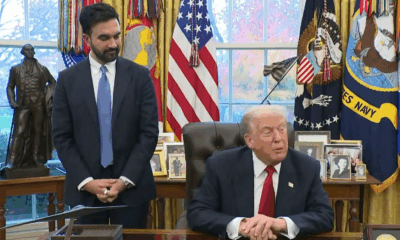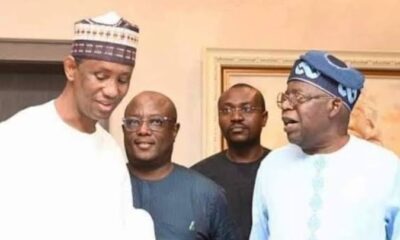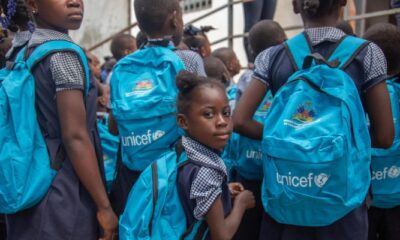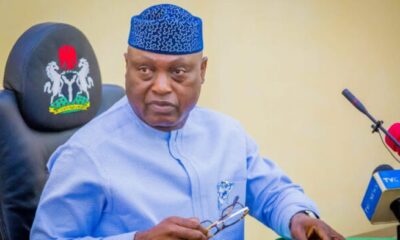Politics
US, Nigeria Officials Meet at Pentagon Amid Religious Freedom Debate
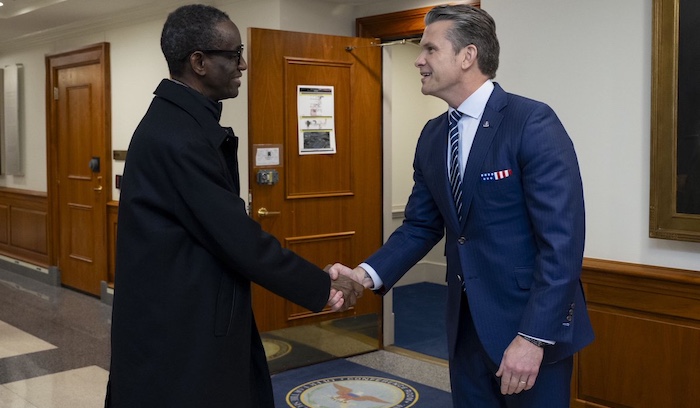
A crucial security meeting took place on March 15, 2024, at the Pentagon, involving United States Defense Secretary Pete Hegseth and Nigeria’s National Security Adviser Mallam Nuhu Ribadu. This discussion follows President Donald Trump’s recent threats of potential US military intervention in Nigeria over allegations of violence against Christians. The meeting, which also included the Chairman of the US Joint Chiefs of Staff, Gen. Dan Caine, was not publicly listed, highlighting the sensitivity of the topics addressed.
Ribadu’s visit to Washington is part of Nigeria’s efforts to counter what its government describes as “harmful mischaracterisations” regarding religious freedom and the broader security landscape in the country. This engagement follows Trump’s alarming remarks, where he indicated that the US military might “go in fast, vicious, and sweet” against what he termed “Islamic terrorists killing Christians in Nigeria.” This statement came after increased media attention from far-right outlets and Republican lawmakers, including Sen. Ted Cruz and Rep. Riley Moore, who have amplified concerns about alleged Christian genocide in Nigeria.
In response to these developments, the US government has re-designated Nigeria as a Country of Particular Concern (CPC) due to reported violations of religious freedom, a designation that Nigeria has firmly rejected. President Bola Ahmed Tinubu has asserted that this decision is based on “misinformation and inaccurate data,” emphasizing the country’s commitment to safeguarding the freedom of worship for all its citizens.
Security analysts in both Washington and Abuja caution that any US military intervention may be logistically unfeasible and could have destabilizing effects on the region. The US maintains a limited military presence in West Africa, particularly following its withdrawal from key drone bases in Niger.
During a press briefing, Deputy Assistant Secretary of State Jacob McGee noted that Trump’s warning has fostered “frank conversations” with Nigerian officials, indicating a shift in diplomatic engagement. “We’re seeing engagement from the Nigerian side. Civil society groups welcomed the CPC redesignation, and we expect tangible steps from Abuja,” he stated.
On Capitol Hill, Rep. Riley Moore expressed his concern for the protection of Christians during his discussions with the Nigerian delegation. The Nigerian government has reiterated that casualties among both Christians and Muslims occur in the complex security environment shaped by groups such as Boko Haram, ISWAP, and various armed bandit factions.
Ribadu’s visit also includes meetings with military, intelligence, and congressional leaders, reflecting Abuja’s broader diplomatic strategy to mend strained US-Nigeria relations and safeguard existing security partnerships. Accompanying Ribadu are key officials, including the Inspector General of Police Kayode Egbetokun, Attorney General Lateef Fagbemi, and Chief of Defence Staff Olufemi Oluyede. This high-level engagement underscores Nigeria’s intent to correct narratives framing the country as hostile to Christians, focusing instead on a more nuanced understanding of its security challenges.
-

 Entertainment3 months ago
Entertainment3 months agoAnn Ming Reflects on ITV’s ‘I Fought the Law’ Drama
-

 Entertainment4 months ago
Entertainment4 months agoKate Garraway Sells £2 Million Home Amid Financial Struggles
-

 Health3 months ago
Health3 months agoKatie Price Faces New Health Concerns After Cancer Symptoms Resurface
-

 Entertainment3 months ago
Entertainment3 months agoCoronation Street’s Carl Webster Faces Trouble with New Affairs
-

 Entertainment3 months ago
Entertainment3 months agoWhere is Tinder Swindler Simon Leviev? Latest Updates Revealed
-

 Entertainment4 months ago
Entertainment4 months agoMarkiplier Addresses AI Controversy During Livestream Response
-

 Science1 month ago
Science1 month agoBrian Cox Addresses Claims of Alien Probe in 3I/ATLAS Discovery
-

 Entertainment4 months ago
Entertainment4 months agoKim Cattrall Posts Cryptic Message After HBO’s Sequel Cancellation
-

 Entertainment2 months ago
Entertainment2 months agoOlivia Attwood Opens Up About Fallout with Former Best Friend
-

 Entertainment3 months ago
Entertainment3 months agoMasterChef Faces Turmoil as Tom Kerridge Withdraws from Hosting Role
-

 Entertainment4 months ago
Entertainment4 months agoSpeculation Surrounds Home and Away as Cast Departures Mount
-

 World3 months ago
World3 months agoCole Palmer’s Mysterious Message to Kobbie Mainoo Sparks Speculation

